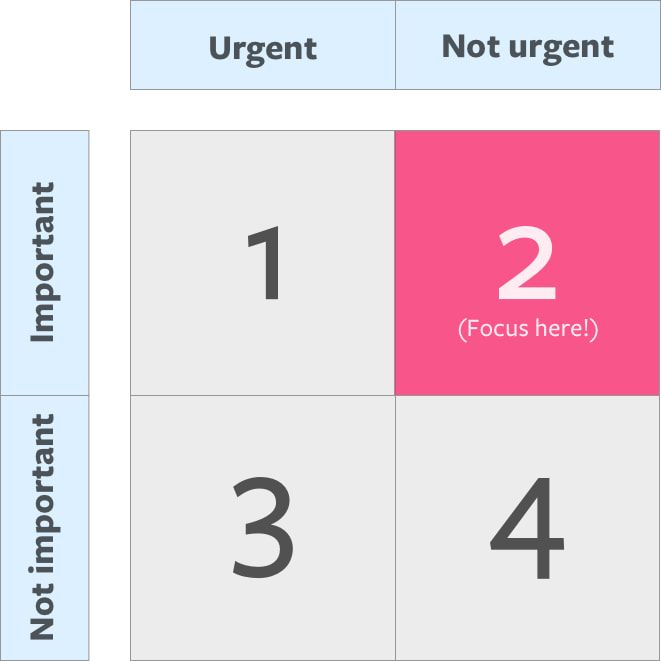Finding time to learn
You know learning is important. You want to do it, but you can’t seem to find the time.
You’re drained after work. All you want to do is relax on the couch. On weekends, you want to spend time with friends and family.
How do you find time to learn?
Where do you spend your time?
The lack of time is often cited as the main obstacle to learning. But time isn’t the problem. Everyone has 24 hours. What matters is how you spend it.
There are four kinds of things you can spend time on:

Quadrant 1 contains things that are important and urgent. These can be work-related things with a deadline. They can things that throw you into a crisis mode.
Quadrant 2 contains things that are important, but not urgent. You don’t have a need to do these things immediately, but if you do them, your life can get significantly better. Learning is often in the second quadrant.
Quadrant 3 contains things that are not important but urgent. They don’t affect your life much if you don’t do them. You want to reduce activities in Quadrant 3. One example is keeping up with Twitter.
Quadrant 4 contains things that are not important and not urgent. You don’t want to do these things if possible.
Inspect yourself. Where do you spend most of your time?
Ideally, you want to spend most of your time in Quadrants 1 or 2. If you don’t, ask yourself why. Why are you spending so much time in Quadrants 3 and 4?
What are your priorities?
How do you want your life to go?
Important work is work that directs your life towards the direction you want to go. Everything else is a distraction.
Don’t hang out with people that sap your energy. That’s time in Quadrant 4. Spend time with people who recharge you so you can find the energy to do Quadrant 1 or 2 stuff.
Don’t work overtime at a job you hate. That’s time in Quadrant 3 because the work doesn’t help you get to where you want to be.
Don’t work overtime for a job you love. That might be in Quadrant 1, you might love your job, but you might get burned out. No job is worth burning out for.
Audit your life and make sure you spend time on things that are important to you. If you don’t have enough time, you need to cut back. You might even need to cut down on work. Grace, a student who enrolled in Learn JavaScript, took a pay cut to learn. Read why she did that here.
Note: read the 7 habits of highly effective people to find out more about the four quadrants.
Finding time despite important commitments
If you have more commitments, you have less time for yourself. But these commitments do not have to prevent you from learning.
You can find time despite your commitments.
How? Two ways.
- Focus on what’s most important
- Block out time for learning
Focus on what’s important
You don’t have to learn everything at once. You don’t need to have the latest information.
Learn what is important to get you to the next stage. Other things can wait.
For example, I want to learn Vue. I also want to learn to draw. But I don’t spend time on Vue or drawing because they’re not important to me right now.
I spend time on marketing, writing, and developing quality courses instead.
Block out time for learning
Set aside a time for learning. Let no one distract you. Not even yourself.
Communicate with your spouse (or family members) if they disagree with you. You need their support. You need them to leave you alone while you learn.
If you don’t have their support yet, you need to spend time with them until you have their support. Sean McCabe explains how you can do it in Overlap.
Wrapping up
How you navigate yourself through life depends on the knowledge you have in your brain. They’re your weapons.
Learn something every day.
You can find time to learn by:
- Cutting time from activities that aren’t important
- Focus on learning what’s important
- Blocking out time for learning
How are you going to find time to learn? I’d love to hear your thoughts. Let me know in the comments below :)
